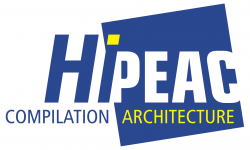At the vanguard of European computing systems: HiPEAC17

The Vision 2017 proposes a reinvention of computing. ‘We are at a crossroads, as our current way of making computers and their associated software is reaching its limit,’ says Editor of the Vision, Marc Duranton of CEA. ‘We need to develop more efficient approaches to cope with the challenges of safety, security, privacy, energy efficiency and increasing complexity. It really is the right time to reinvent computing!’
The Vision 2017 also highlights the economic importance of Europe remaining at the forefront of technological innovation. In that vein, HiPEAC17 is not a traditional academic conference; the network brings together computing systems research teams based in universities and research labs with those based in industry so as to ensure that research is relevant to market needs. HiPEAC17 will also serve as a platform for HiPEAC’s recruitment service, which aims to help match European companies and research teams with the people with the skills they need, something that often proves to be a hurdle to business development.
Highlights of the conference include:
• Launch of Matryx Computers, pre-integrated (hardware and fully-featured OS) computer platforms based on FPGA, by Embedded Computing Specialists (Brussels);
• New startup Zeropoint Technologies (Stockholm), which is innovating ultrafast memory compression systems;
• RWTH Aachen spinoff SILEXICA, just awarded $8 million in series A funding and celebrating the release of its next generation SLX Tool Suite for multicore platforms;
• Keynotes from well-known experts Kathryn McKinley (Microsoft), Sarita Adve (University of Illinois) and Sandro Gaycken (Digital Society Institute, ESMT Berlin) will focus on data centre tail latency, memory hierarchies in the era of specialization, and the ‘as yet unsolvable problem’ of cybersecurity.
The City of Stockholm will host a conference evening reception at the famous Stockholm City Hall, home of the Nobel Prize banquet. Once again, the biggest international names in technology have shown their confidence in HiPEAC by generously supporting the conference. (See below for a full list of sponsors).
Social media hashtag: #HiPEAC17
About HiPEAC
Since 2004, the HiPEAC (High Performance and Embedded Architecture and Compilation) project has provided a hub for European researchers in computing systems; today, its network, the biggest of its kind in the world, numbers around 1700 specialists. The project offers training, mobility support and dissemination and recruitment services, along with numerous networking facilities to its members. It is funded by the European Union’s Horizon 2020 research and innovation programme under grant agreement no. 687698.
HiPEAC organises four networking events per year: the HiPEAC conference, two Computing Systems Weeks and a summer school. The conference attracts over 500 participants, and the 2017 edition is organised by KTH Royal Institute of Technology in Stockholm.
The following organisations are generously supporting HiPEAC17: Google, Intel, ARM, Imagination Technology, Zeropoint Technologies, Ericsson, Samsung, Embedded Computing Specialists & Matrix Computers, Softeam, Thales, Barco, Cobham Gaisler, Adepteva, Silexica, Synective Labs, IMSYS, the City of Stockholm and KTH Royal Institute of Technology Stockholm.
www.hipeac.net
@hipeac
www.linkedin.com/company/hipeac
Keywords
computing, architecture, compilers, software, hardware, cybersecurity, data, big data, energy efficiency, tech transfer, digitisation of industry, smart cities, accelerators, GPU, memory, edge computing, multi-core, manycore, processors


